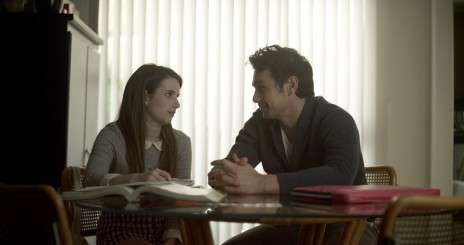There’s one point during Palo Alto where first-time director Gia Coppola—yes, from that Coppola family—chooses to play the famous Phoebe Cates pool scene from Fast Times At Ridgemont High on a television screen. It’s a bold acknowledgement of one of the all-time greatest coming-of-age films, a legacy that Coppola no doubt hopes her adaptation of James Franco’s short story collection of the same name can match. But if Fast Times is the mother of all films about American adolescence, Palo Alto is its misunderstood daughter—darker, edgier, and ultimately, to Coppola and the actors’ credit, more realistic.
Coppola’s film depicts a Palo Alto where the offspring of the city’s affluent residents party precariously and—more so than your typical teenagers—just can’t seem to figure things out. The most reckless of the bunch is Fred (Nat Wolff), a loose cannon, who constantly challenges everyone around him, including his more laid-back friend Teddy (Jack Kilmer). Their sometimes affectionate, sometimes coarse relationship is heavily explored, as are their relationships with girls. Fred latches onto and begins to take advantage of Emily (Zoe Levin), who is naïve and promiscuous. April (Emma Roberts), on the other hand, is a virgin whose interest in Teddy—which he reciprocates—is blocked by petty circumstances and the uncomfortable sexual advances from her soccer coach, Mr. B (Franco).
All of the lead actors submit fairly strong performances. If anything, the weakest is ironically the more experienced Franco, who puts his usual relaxed and confident self on display, which doesn’t sit quite right for a teacher risking pretty serious repercussions for his actions. But Roberts, up against a very impressive debut from Kilmer—yes, from those Roberts and Kilmer families—is still the standout of the film. Tasked with portraying the most down-to-earth of all the main characters, Roberts brilliantly reveals to the audience the struggles that April has in her calculated flirtations with experimentation, especially when she is pushed to react impulsively to what goes on around her. With peers who seem to have little inhibition and a coach who is desperately trying to get into her pants, April finds her innocence under attack from multiple pressure points. Watching her come to terms with that while trying to figure out what she wants is arguably Palo Alto’s strongest storyline for the majority of the film.
The intrigue of the Fred-Teddy relationship is another highlight. The two misfits oscillate between being a dynamic duo and completely incompatible companions. Even though Teddy is the more composed of the two, he’s attracted to the same type of illicit and unwise behaviour as Fred. Whereas Teddy’s journey throughout the film has him embracing his artistic outlets and managing to control his self-destructive impulses, Fred is on a downward trajectory. We get several telling moments that reveal the doubt and uncertainty behind his abrasive exterior. Their complicated friendship captures our attention immediately and returns to the fore in a big way at the end.
Just as the lifelike ebbs and flows of that relationship reward our investment in it, Palo Alto is at its best when its realism shines. Coppola, who also wrote the screenplay, infuses her script with dialogue that’s surprisingly spot-on in terms of how teenagers speak, and films the frequent party scenes masterfully. Franco’s stories are based on real-life occurrences (some of them taken from his own life) and Coppola blends elements from many of them together and into a film narrative without losing that real quality. Despite their individual acting success, Teddy and April have certain moments that occasionally feel slightly unrealistic or cliché—though it’s hard to find any major faults throughout the script.
From Fast Times to Francis Ford Coppola, Palo Alto carries the weight of the past on its shoulders, but doesn’t buckle. While the problems of wealthy Palo Alto teenagers might not seem to us like they should be that bad, Gia Coppola and her team bring them to the screen in a believable and absorbing fashion.
Palo Alto begins playing at Cinema du Parc (3575 Parc) June 6. Tickets are $8.50.








